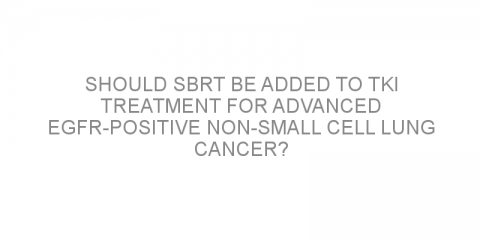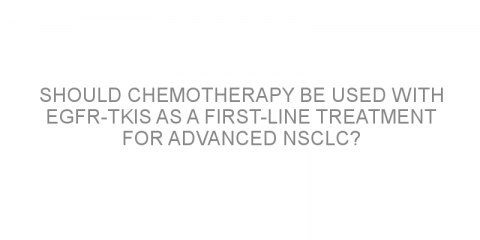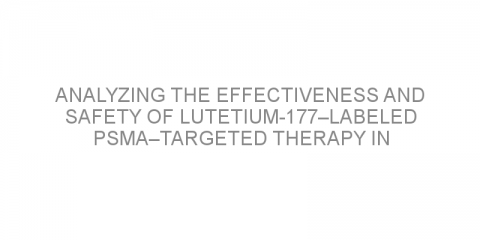In a nutshell This study looked at the use of focal cryotherapy (FC) for the treatment of low- to intermediate-risk prostate cancer (PC). The authors found that the use of FC was safe and increased time to further therapy with similar survival compared to active surveillance (AS). Some background PC is one of the most common forms of...
Read MoreShould SBRT be added to TKI treatment for advanced EGFR-positive non-small cell lung cancer?
In a nutshell This trial was carried out to assess the effectiveness of EGFR-tyrosine kinase inhibitors (TKIs) with stereotactic body radiation therapy (SBRT) in advanced non-small-cell lung cancer (NSCLC). The authors found that TKIs plus SBRT improved the survival without disease worsening for these patients. Some background Lung cancer...
Read MoreShould chemotherapy be used with EGFR-TKIs as a first-line treatment for advanced NSCLC?
In a nutshell This review was carried out to analyze the effectiveness and safety of EGFR tyrosine kinase inhibitors (TKIs) plus chemotherapy (CT) versus EGFR-TKIs alone as a treatment for advanced non-small-cell lung cancer (NSCLC) that is EGFR-positive. The authors found that EGFR-TKIs and CT treatment improved survival for these patients while...
Read MoreConsolidation chemotherapy before reduced intensity allogeneic hematopoietic stem cell transplantation for patients with acute myeloid leukemia
In a nutshell This study aimed to investigate if consolidation chemotherapy before reduced-intensity conditioning (RIC) allogeneic hemopoietic stem cell transplant (alloHSCT) improved outcomes for patients with acute myeloid leukemia (AML). This study concluded that exposure to consolidation chemotherapy before RIC alloHSCT may help patients...
Read MoreAnalyzing the effectiveness and safety of Lutetium-177–labeled PSMA–targeted therapy in patients with metastatic castration-resistant prostate cancer.
In a nutshell This study reviewed the effectiveness and safety of lutetium-177 [177Lu]-prostate-specific membrane antigen (PSMA)-targeted radioligand therapy (PRLT) for the treatment of patients with metastatic castration-resistant prostate cancer (mCRPC). The data showed that PRLT was associated with good outcomes and manageable side effects. Some...
Read MoreComparing alectinib to ceritinib treatment for ALK-positive non-small-cell lung cancer that failed after crizotinib treatment
In a nutshell This study compared the effectiveness of ceritinib (Zykadia) and alectinib (Alecensa) in patients with ALK-positive non-small-cell lung cancer (NSCLC) who previously had a crizotinib (Xalkori) treatment failure. The data showed that both ceritinib and alectinib were effective in these patients. Some background Non-small-cell lung cancer...
Read MoreComparing PD-1/PD-L1 inhibitors versus chemotherapy in patients with previously treated advanced non-small-cell lung cancer.
In a nutshell This study investigated the effectiveness and safety outcomes of programmed death-1 (PD-1)/PD ligand 1 (PD-L1) inhibitors versus chemotherapy in patients with previously treated advanced non-small-cell lung cancer (NSCLC). The data showed that PD-1/PD-L1 inhibitors were safer and more effective than chemotherapy in these patients. Some...
Read MoreDoes the combination of paclitaxel and alisertib improve the outcomes of patients with breast cancer?
In a nutshell The authors evaluated the safety and effectiveness of paclitaxel (Taxol) in combination with alisertib (MLN8237) for the treatment of advanced breast cancer (BC). The authors observed that a weekly, reduced dose of paclitaxel combined with alisertib improved the survival without cancer worsening in these...
Read MoreDoes pembrolizumab improve survival of patients with metastatic non-small-cell lung cancer in the long term?
In a nutshell This study evaluated the long-term effectiveness of pembrolizumab (Keytruda) in patients with untreated metastatic non-small cell lung cancer (NSCLC). The authors showed that pembrolizumab increased the long-term survival of patients compared to chemotherapy. Some background NSCLC accounts for most lung cancers....
Read MoreHow effective is rituximab plus gemcitabine and oxaliplatin for patients with refractory/relapsed DLBCL?
In a nutshell This study aimed to evaluate the efficacy and safety of R-GemOx (rituximab, gemcitabine, and oxaliplatin) for the treatment of patients with relapsed or refractory (r/r) diffuse large B-cell lymphoma (DLBCL). The authors concluded that R-GemOx is an effective treatment regimen in patients ineligible for intensive treatment. Some...
Read MoreUpdates on the addition of radiotherapy for patients with locally advanced rectal cancer
In a nutshell This study reviewed the role of the addition of radiation therapy (RT) for the treatment of locally advanced rectal cancer (LARC). Researchers suggested that radiation therapy during surgery is associated with a lower recurrence (when cancer comes back) rate. Some background Locally advanced and locally recurrent rectal cancer are...
Read MoreEvaluating the safety and effectiveness of brentuximab vedotin for children with high-risk Hodgkin lymphoma.
In a nutshell This study investigated the safety and effectiveness of incorporating brentuximab vedotin (BV; Adcetris) as a substitution for vincristine in the OEPA (vincristine, etoposide, prednisone, doxorubicin) or COPD (cyclophosphamide, vincristine, prednisone, dacarbazine) chemotherapy regimen in children with high-risk classical...
Read More















